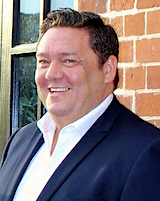 Meet Greg Zweig, Director of Solutions Marketing at US-based GENBAND, who helped to create the world's first IP PBX, who understands the application of technological innovation and how to build a thriving reseller channel, and who quickly made significant gains in the UK having linked up with Timico and Voiceflex.
Meet Greg Zweig, Director of Solutions Marketing at US-based GENBAND, who helped to create the world's first IP PBX, who understands the application of technological innovation and how to build a thriving reseller channel, and who quickly made significant gains in the UK having linked up with Timico and Voiceflex.
Who would have thought that a former farm boy would come to show technological innovation at its best? Zweig grew up on a farm in a town of 4,000 people and one traffic light. Here, a tractor with working headlights represented the dizzy heights of hi-tech. This seems a very thin basis on which to build a pioneering career in comms, but it was fertile ground for cultivating fresh thinking, curiosity and excitement about the possibilities of new technology. So much so that Zweig ultimately helped to create the NBX 100, the world's first commercially available IP PBX product. "A group of 80 incredibly talented people, most of whom had no telephony or PBX experience, changed the way every one of us communicates today," he said.
Zweig's introduction to telecoms - successfully selling key systems and PBXs - provided enough experience and know-how to secure a position with Ethernet telephony start-up NBX (which was acquired by 3Com) in the late 1990s. "I was employee number 12 of the first company to build and ship an IP PBX," he commented. "As a Product Manager for the first IP business phone ever shipped, I learned the technology from the inside out. I learned to make systematic product quality a pillar of product development. Don't let 'good enough' thinking rule the day because nothing impedes sales and a company's long-term growth as much as inconsistent quality.
"Today, I'm intolerant of systemic quality issues. And as a start-up, I also learned what it meant to build a reseller channel from scratch. My early experiences help me every day. I understand the technology and how to make it relevant in the real world."
With UCaaS, Zweig aims to take his experience to exciting new heights and he's swung his attention onto the UK where uptake of UCaaS is occurring faster than anywhere else on earth. On the horizon he sees world domination, but the near-term goal is to become a top three provider of UCaaS in the UK. Zweig's biggest priority is to grow GENBAND's reseller channel, and he is particularly focused on enabling wholesalers including new partners Timico Partners and Voiceflex. "The UK market is already incredibly dynamic and leading the world in terms of UCaaS adoption," said Zweig. "We are entering a decade or more of UCaaS growth and our multi-tenant cloud solution can scale with market demands. That's in stark contrast to solutions that were designed for enterprise use and later bolted into the cloud.
"GENBAND is also investing more in web and mobile UC technology that will be the key part of buying criteria. It used to be enough to sell a hosted IP phone but today that is table stakes. To win share we are investing heavily in WebRTC technology. In early 2016 we are launching a whole new generation of UC clients that use WebRTC to make it less expensive for enterprises to deploy and maintain them."
In 2013 GENBAND launched its first cloud solution, Nuvia Cloud UC. Two years after launching in North America the firm introduced Nuvia to the UK (along with Asia). A year later GENBAND launched Kandy, a Platform as a Service solution designed to make it easy and cost-effective to communication-enable mobile and web applications. "These efforts reflect the changing way we all consume communications and GENBAND's commitment to be a leader in this new world," added Zweig. "We support five million-plus enterprise end users and our Kandy service has over 15 million users after just one year in the market."
While the UK is blazing a trail for UCaaS uptake, most of the offers are 'literally identical', claims Zweig. "It's the same solution," he stated. "I'm not sure how resellers preserve their margin if they only have price as a differentiator. Nuvia Cloud UC is different. More importantly, our roadmap has a different focus and direction. Today, UC is still a separate application but as we move forward we have to give our partners simple tools to embed communications in websites and business apps. That doesn't mean we can ignore the basics, but we have to give them something more. We're giving partners more to offer than just another IP phone and a cool client."
Zweig believes that the next major disruption in the market will be Microsoft's attempt to bundle voice with Office 365. "It's the first over the top player that has the ability to take significant share from traditional providers," he said. "Our offers have got to be differentiated and we need to ensure that we have channels in place that can extol that value to end users. I'm sure that many Comms Dealer readers are concerned that Office 365 will simply be purchased directly from Microsoft, essentially eliminating them from the value chain. GENBAND wants to give them a competitive alternative that preserves their value."
Rewinding the clock, GENBAND was founded in 1999 as General Bandwidth by Paul Carew, Brendon Mills, Ron Lutz and Steve Raich in Austin, Texas, and received initial venture capital funding of $12 million. In 2004, Charles Vogt joined the company as CEO and President. He changed the firm's trajectory by aggressively undertaking a series of acquisitions, the most notable being the Nortel CVAS business in 2010. Along the way General Bandwidth changed its name to GENBAND and moved its headquarters to the Dallas area. While GENBAND started as a small media gateway vendor it has ultimately become an end-to-end solution provider for real-time communications across the world.
"The Nortel acquisition was the company's biggest milestone," said Zweig. "Not only was it a huge undertaking, it also provided the foundation for our current investment structure and management team."
Today, GENBAND is wholly owned by One Equity Partners (OEP) and led by a longtime member of OEP, David Walsh. The firm has more than 1,600 employees and provides real-time communications solutions to 700-plus service providers in over 80 countries. "The rapid acceptance of cloud services is transforming our business," added Zweig. "As a vendor that has built solutions for service providers for years, you could say that GENBAND was building cloud solutions before there was a cloud - it's our wheelhouse.
We're heavily investing in solutions that make cloud communications even more compelling and further drive down the cost and complexity of UC deployments. In addition, the cloud has changed the speed of adoption as customers are no longer limited to the communication provider in their area. We see a major change in how end users and our partners buy and resell services."
Zweig also observes that the consolidation happening in the UCaaS market is good for the industry as the alternative is irrational margin erosion from a constant stream of new entrants. "It just encourages us to look for wholesalers that have staying power, that are financially healthy and willing to continue to invest," he added. "Our Nuvia Cloud UC solution is new to the market so we have to build brand awareness and build more reference accounts in each vertical. Of course, it's already a competitive market but we also know that a majority of the resellers are selling the same solution. We know that we can deliver a differentiated offer so we are excited to build upon our early success and, for example, deliver a lower cost version of our contact centre for SMBs and localise the solution for more European languages."
Zweig says Nuvia will be the obvious growth engine but he expects Kandy to be the difference maker. "VARs will need a way to differentiate, to add value and find sticky services that can't be commoditised," he commented. "Their role has evolved radically as most resellers have had to become services-focused organisations versus classic product VARs. As the cloud becomes more dominating, the services revenue is also in jeopardy. VARs will adjust by becoming more like systems integrators, able to extend cloud services with vertical specific or application specific elements.
"For example, if a medical facility wants to deploy cloud UC, a VAR can't distinguish itself by selling the same solution as five of their rivals. That's why GENBAND developed the Kandy PaaS solution, to help resellers and developers embed communication services that stand out from the herd. Once deployed, these services are sticky enough to reduce price competition. This is the future. People in the industry should not reminisce about 'the good old days'. Times change, and we should appreciate our industry's heritage but not get trapped by it. There are plenty of great opportunities ahead, people just need to accept that we have to change to stay in the game."

 Glasgow-based Exsel Group's Managing Director Tom McDonald has the Midas touch. He joined the fledgling company two years ago and quickly mapped out its growth journey towards a glittering SME of the Year nomination at this year's Scottish business awards.
Glasgow-based Exsel Group's Managing Director Tom McDonald has the Midas touch. He joined the fledgling company two years ago and quickly mapped out its growth journey towards a glittering SME of the Year nomination at this year's Scottish business awards. By Andy Grant, Managing Director, Bowan Arrow: What is the point of isolated campaigns? A joined up, integrated and planned approach to marketing campaigns will of course deliver better results.
By Andy Grant, Managing Director, Bowan Arrow: What is the point of isolated campaigns? A joined up, integrated and planned approach to marketing campaigns will of course deliver better results. Billing and channel support business TMS has announced a raft of management changes.
Billing and channel support business TMS has announced a raft of management changes.